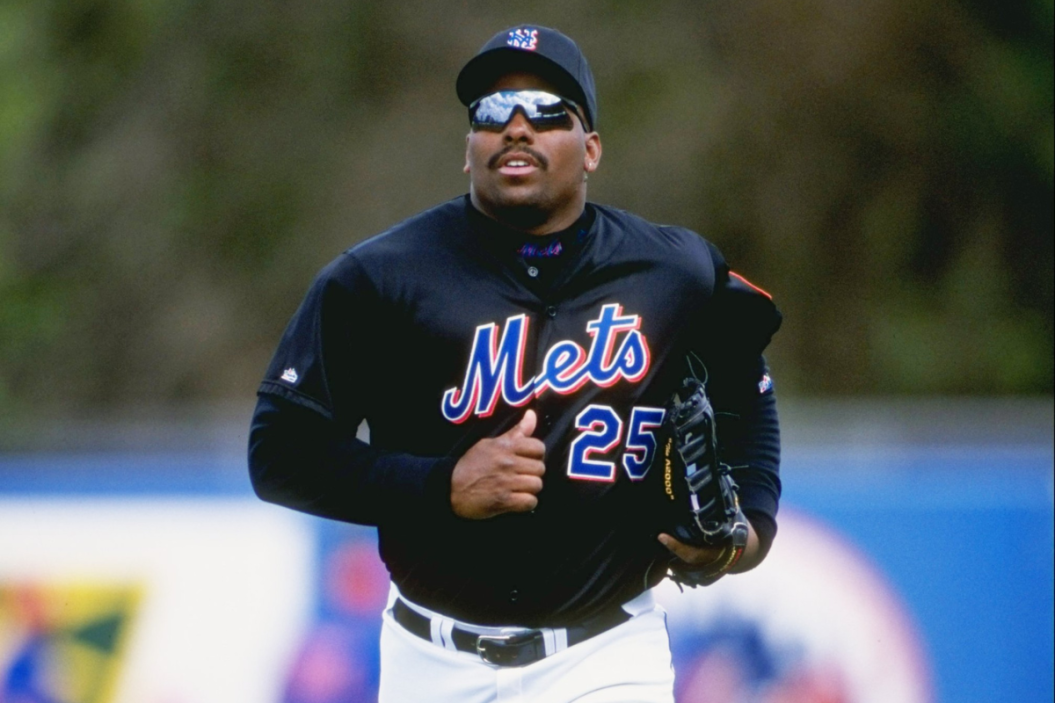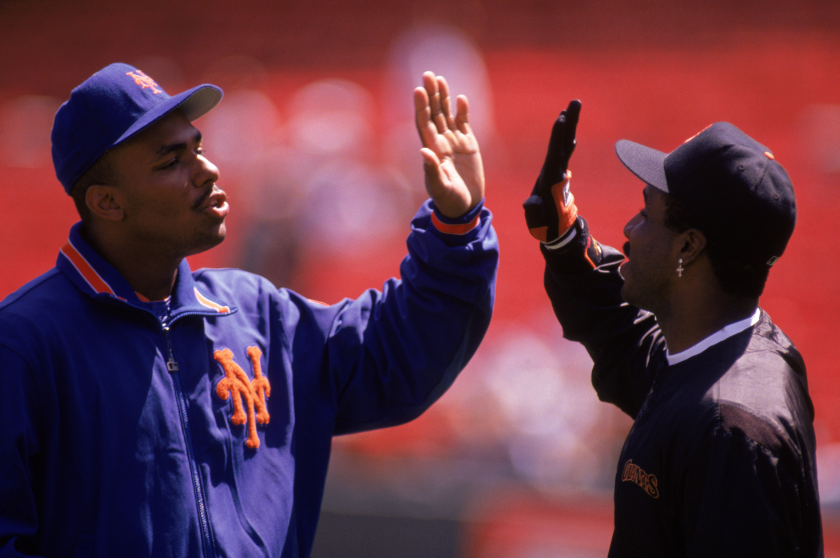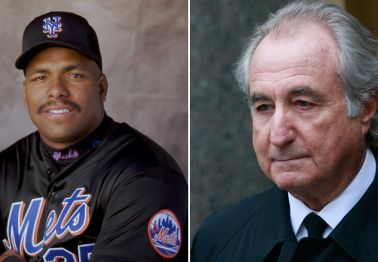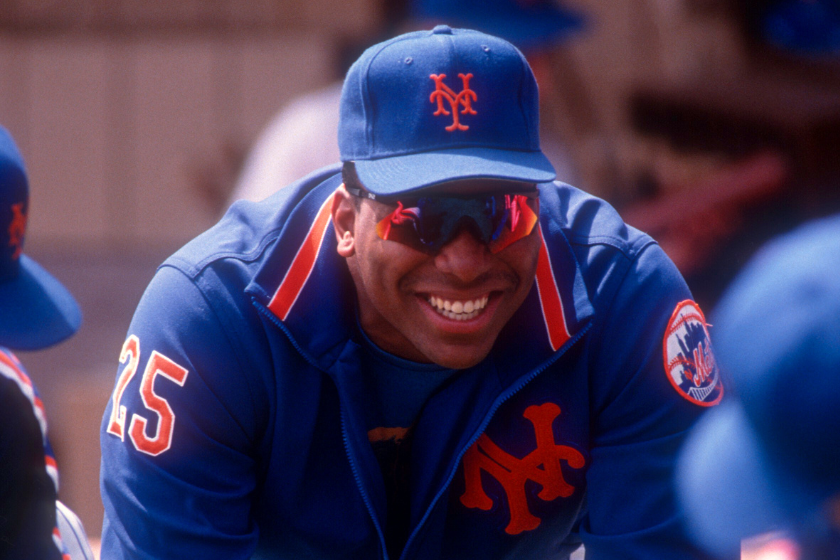When the first of July rolls around, you might hear a certain proclamation from jaded New York Mets fans: Happy Bobby Bonilla Day!
Even when the Mets are trending upwards under the new ownership of hedge fund mogul Steve Cohen, Bobby Bonilla Day still makes Mets fans angry. It's an old relic of the past regime that keeps rearing its ugly head every 365 days. Bobby Bonilla Day is a sore spot for the Mets franchise, no question.
How did we get to this point? Why all the fascination around a very good, but not great, former MLB player? Let's track the journey that led us to Bobby Bonilla Day.
Bobby Bonilla's Solid MLB Career
RELATED: Barry Bonds' Broken Bat HR Showed Off His Pure Muscle
First, a little more about the New York City native who grew up in the shadow of Yankee Stadium in the Bronx. After going unselected in the 1981 MLB Draft out of Lehman High School, Bonilla was signed by the Pittsburgh Pirates. In 1985, when he was still in the minors, he suffered a broken leg and that offseason he was left unprotected in the Rule 5 Draft. The Chicago White Sox picked him up and he made his MLB debut with them in 1986.
However, Bonilla's time with the White Sox was brief. He didn't even make it through his first full season before he grew disgruntled (a recurring theme) and was traded back to the Pittsburgh Pirates.
With the Pirates, Bonilla was moved from a third baseman to an outfielder, where he enjoyed quite a run with the team alongside Barry Bonds. He was an All-Star for the first time in 1988 and made four All-Star Games in a row. He also won a Silver Slugger award in three of those four seasons.
Following the 1991 season, Bonilla signed a five-year, $29 million deal with the New York Mets, which made him the highest-paid player in the National League. He made two more All-Star Games with the Mets, but after the second one in 1993 he was traded to the Baltimore Orioles after more disgruntlement.
After a year and some change with the Orioles, he signed as a free agent with the Florida Marlins. He played well that first season in the Sunshine State, which was the year the Marlins won the 1997 World Series. After that, he was part of the Marlins' fire sale and was dealt to the Los Angeles Dodgers early in 1998.
Bonilla didn't even finish a single season with the Dodgers before he was dealt back to the Mets. He only played 60 games with the Mets in 1999 before he was released (after clashing with manager Bobby Valentine), and we will be getting back to this for Bobby Bonilla Day purposes.
The outfielder played one season with the Atlanta Braves and then one season with the St. Louis Cardinals before retiring in 2001. Again, it's worth keeping in mind that he last played in MLB in 2001.
Bobby Bonilla's Historic Mets Contract
Happy Bobby Bonilla Day.
**Bonilla hasn?t played for the New York Mets since 1999. But, until 2035, the team still has to pay him yearly increments of $1.19 million. https://t.co/ifEHizQlxC
— FiveThirtyEight (@FiveThirtyEight) July 1, 2020
Like we said, the New York Mets released Bonilla after the 1999 season. They still owed him $5.9 million, but Mets owner Fred Wilpon didn't want to pay it off right away. As such, Bonilla's agent and Wilpon worked on a deal. Deferred payments were set to begin being paid off in 2011. There would be annual payments from Mets ownership to Bonilla of just over $1.19 million per year.
Payments would run from 2011 through 2035 with a total of $29.8 million being paid out on Bonilla's deal. That included an eight percent interest rate as well. Bonilla's payday was set for July 1 each year, which is what we now know as "Bobby Bonilla Day."
Why did Fred Wilpon agree to this? Well, at the time, Wilpon had a lot of money tied up in investments that promised double-digit returns, which would have meant plenty of profit for Mets ownership.
There was only one problem with that plan. That investment? It was with Bernie Madoff, and that deal turned out to be a Ponzi scheme. Wilpon took a huge hit financially, and yet he was still having to pay out $1.19 million per year to Bonilla. As such, "Bobby Bonilla Day" became a sign of everything wrong with Mets ownership to Mets fans and a source of humor for the likes of ESPN.
That being said, Bonilla's isn't the only deferred-payment deal ever made. In fact, the Mets also have a similar deal with Bret Saberhagen that began payment in 2004 and will last for 25 years. Bruce Sutter had a deferred-payment deal with the Braves, and Max Scherzer actually has one with the Washington Nationals.
These days, the Mets are no longer owned by the Wilpons. Instead, Steve Cohen owns the team, and he's the richest owner in MLB. He should have no problem handling Bobby Bonilla Day. In fact, one of the ideas Cohen pitched in his early days as Mets owner was treating Bobby Bonilla Day like a National Baseball Holiday. Bring the former Mets slugger back to Flushing, have him throw out the first pitch, give away t-shirts, the whole nine yards.
The sooner Mets fans can reclaim the day, the better headspace Mets fans will have in the future.
Bobby Bonilla's Net Worth Shows He's Treating His Money Well
Speaking of the home run hitter, six-time All-Star and World Series champion, according to Celebrity Net Worth, Bobby Bonilla's estimated net worth is $20 million. Of course, he also knows that he has almost $1.2 million coming to him until 2035, when he will be 72.
He's set for life, and for that he can thank his agent for his shrewd wheeling and dealing. Well, and also his skills as a professional baseball player.
This article was originally published on June 25, 2021, and has been updated since.



